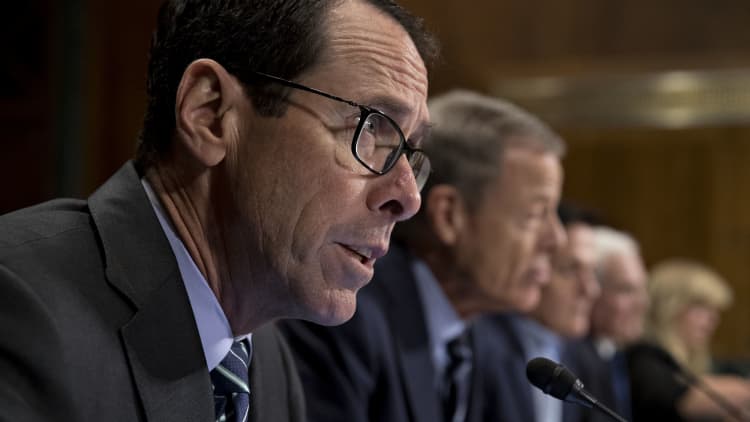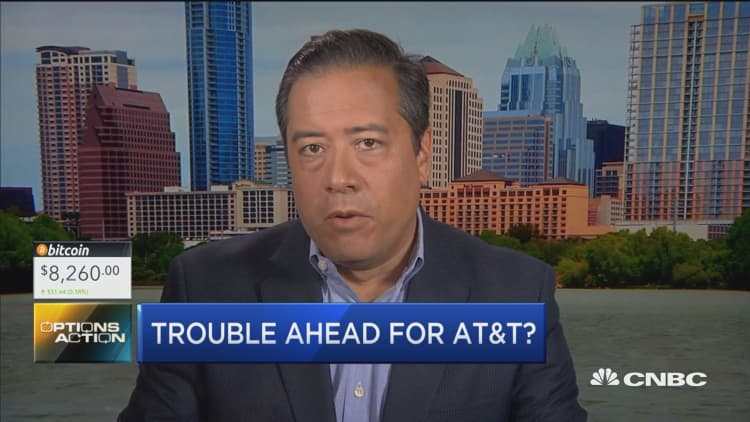
AT&T CEO Randall Stephenson took the stand on Thursday in possibly the most anticipated moment in the antitrust case against the telecom giant's proposed merger with Time Warner. Stephenson's testimony addressed the need for targeted advertising and vertical integration to keep up in the tech era.
"If you miss one technology cycle, it may not kill you, but it will make you sick for a very long time," Stephenson said.
The $85 billion proposed merger has faced criticism since it was announced in October 2016 — first from then-presidential candidate Donald Trump, and later from the Justice Department. In November 2017, the DOJ moved to block the deal, arguing AT&T could threaten to withhold Time Warner's programming from other distributors to force higher prices.
The testimony is a career-defining moment for Stephenson.
A blocked Time Warner acquisition would be the third misstep for Stephenson in his legacy as AT&T CEO. The company tried to buy wireless competitor T-Mobile for $39 billion in 2011, but the deal was blocked by regulators. He's also been criticized for overpaying for satellite TV company DirecTV, which AT&T bought for $67 billion in 2015. If this deal falls through,
FANG-ophobia
The media and entertainment industry is going through disruption, Stephenson argued on Thursday, due to technology shifts driven by FANG companies — namely, Facebook, Amazon, Netflix and Google (now part of parent company Alphabet). Traditional media, like Time Warner, needs bulk to match the strength of big tech.
He highlighted premium content and targeted advertising as two ways the merger could help both companies.
"We thought we needed to own original content at some point," and Time Warner, Stephenson said, has "the best library in the world."
Critics of the merger have expressed concern that housing content creators and distributors within the same company would be anti-competitive, and that AT&T could threaten to withhold Time Warner programming from other video distributors, knowing customers could switch to AT&T's DirecTV as an alternative.
But Stephenson has in the past argued Netflix and Amazon both house content creation and distribution in-house. Furthermore, it would make bad business sense to restrict distribution, as it would limit revenue from affiliate fees and advertising.
"The more people who are watching your content, the more your content is worth," he said during Thursday's testimony.
When asked by AT&T-Time Warner's lead counsel Daniel Petrocelli about the significance of the potential deal, Stephensen described it as "game changing."
Wireless "changed our company," he added. "I believe we are on the cusp of another one of those moments."
Bewkes cites 'tectonic changes'
The fifth week of trial has seen testimony both from Time Warner CEO Jeff Bewkes and AT&T CEO Randall Stephenson.
Bewkes testified on Wednesday, painting a grim picture of the state of traditional media in the internet era.
Bewkes argued "tectonic changes" in the media industry have rendered traditional networks, like Time Warner, ineffectual advertisers, as evidenced by falling advertising revenue and the decline of pay-TV, as a whole. The new generation of technology companies, like Netflix, Facebook and Google, have the data and resources to serve the right ads to the right users.
He also hit back at the government's claim that the post-merger combined company would be more likely to risk blackouts in contract negotiations with competitors.
"No, I don't agree," Bewkes said on Wednesday. "If our channels are not on, we lose a lot of money .... hundreds of millions of dollars in advertising revenue and subscription revenues."
WATCH: Options traders betting against AT&T into earnings



